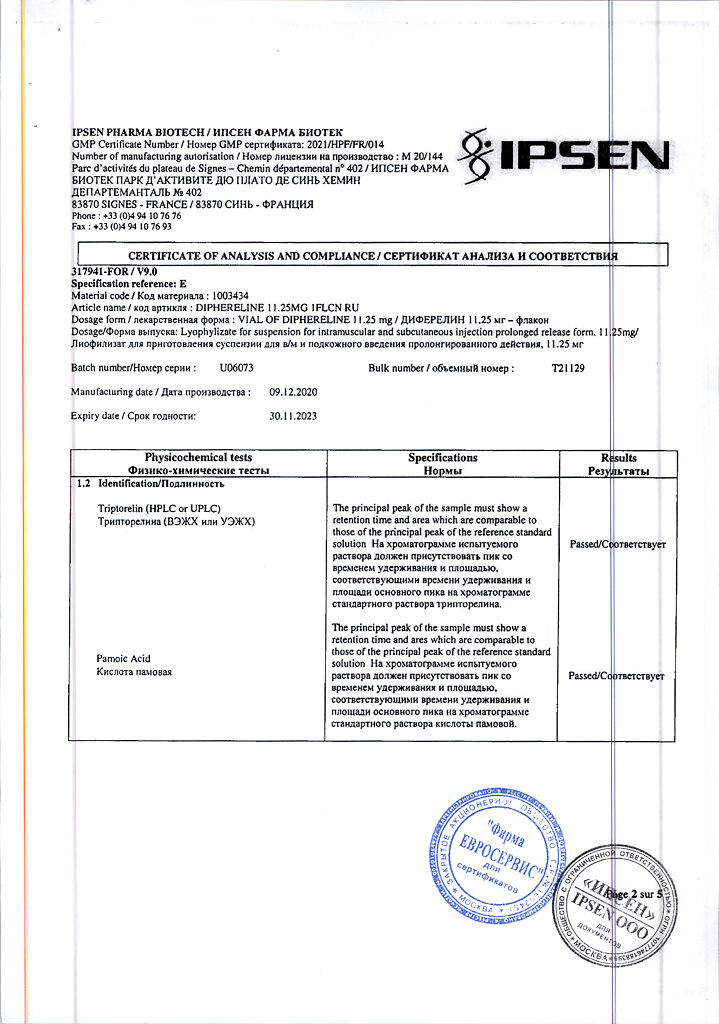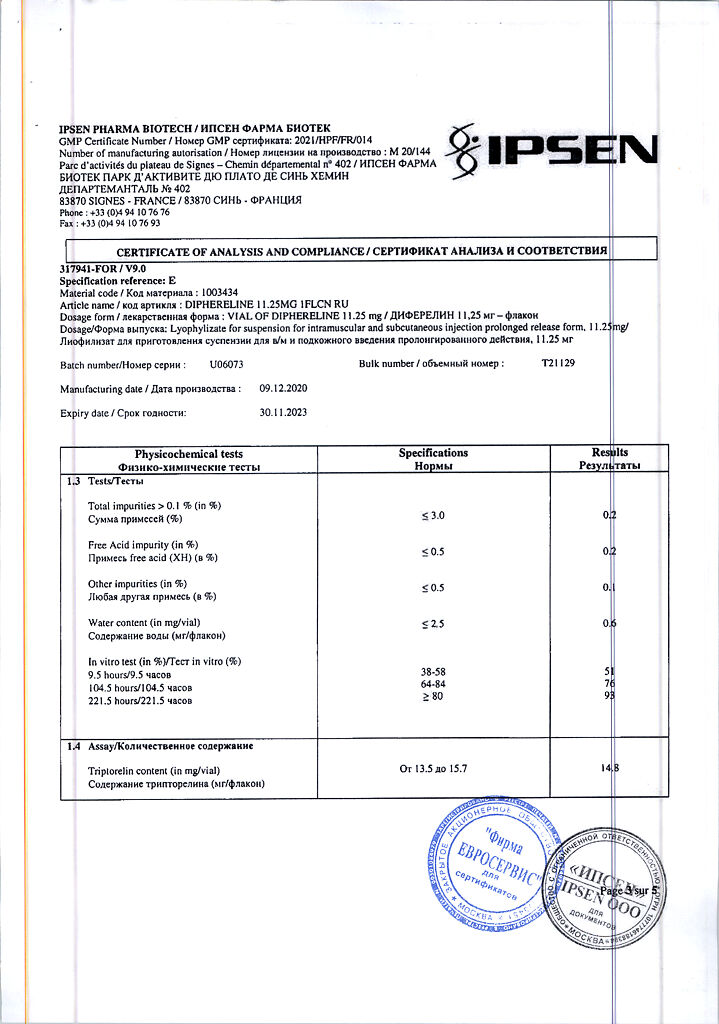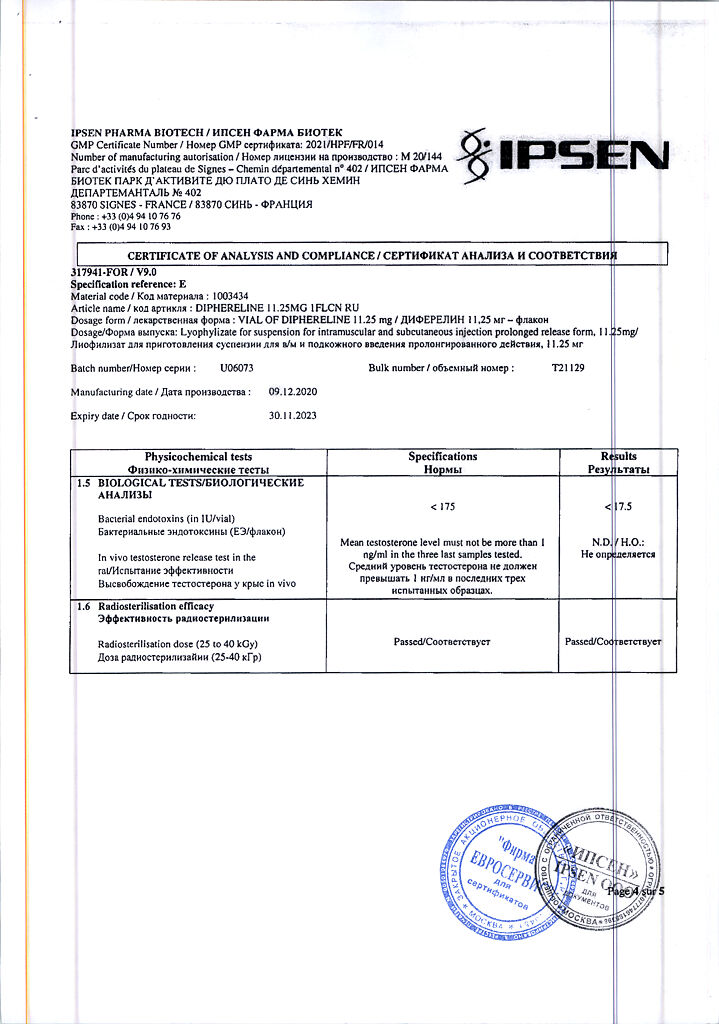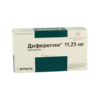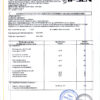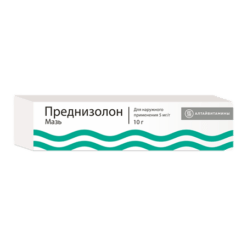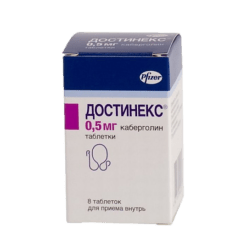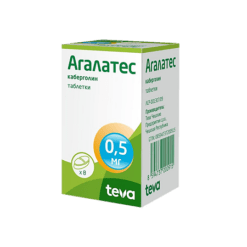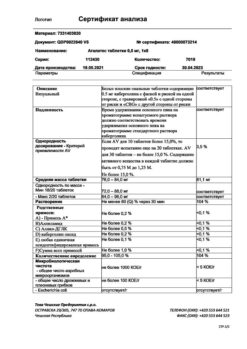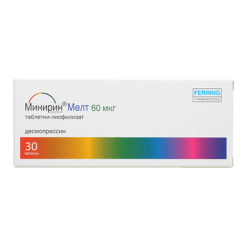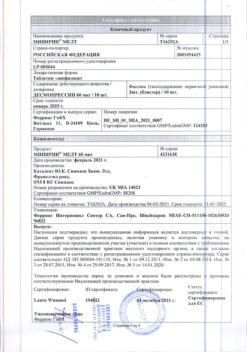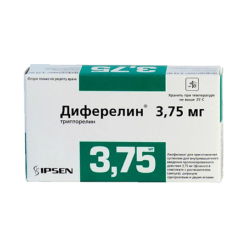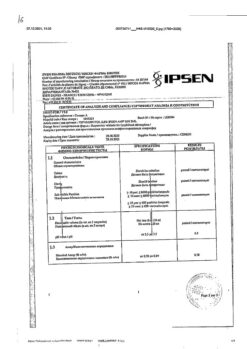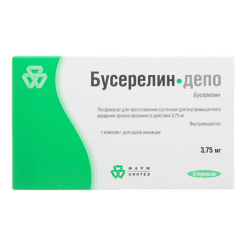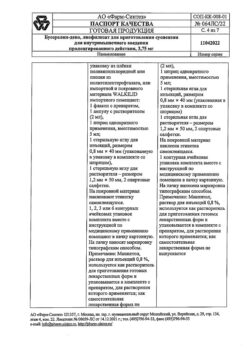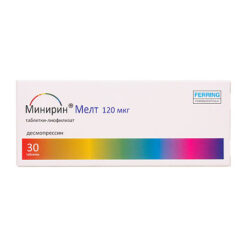No products in the cart.
Differelin lyophilizate 11.25mg
€1.00
Out of stock
(E-mail when Stock is available)
Description
Pharmacodynamics
A synthetic decapeptide analog of natural GnRH.
After a short initial period of stimulation of the gonadotropic function of the pituitary gland, tryptorelin has an inhibitory effect on gonadotropin secretion with subsequent suppression of testicular and ovarian function.
In the initial period of use, Dyferelin® temporarily increases the concentration of LH and FSH in the blood; accordingly, the concentration of testosterone in men and estradiol in women increases.
Long-term treatment reduces concentrations of LH and FSH, which leads to a decrease in testosterone levels (to levels corresponding to the post-testiculectomy condition) and a decrease in estradiol levels (to levels corresponding to the post-ovariectomy condition) – by about 20 days after the first injection and remains unchanged throughout the duration of the drug administration. Long-term treatment with triptorelin suppresses estradiol secretion in women and thus prevents the development of endometrioid ectopias.
Pharmacokinetics
Absorption and distribution
When Dyferelin is administered by m/m at a dose of 11.25 mg, the Cmax of triptorelin in plasma (in men and women) is determined approximately 3 hours after injection. After a declining phase of concentration lasting for the first month until day 90, the concentration of circulating tryptorelin remains constant (approximately 0.04 to 0.05 ng/mL in the treatment of endometriosis and approximately 0.1 ng/mL in the treatment of prostate cancer).
Indications
Indications
Prostate cancer:
treatment of locally advanced prostate cancer in monotherapy or as an adjuvant agent during radiation therapy;
treatment of metastatic prostate cancer.
Genital and extragenital endometriosis (stages I-IV).
Pharmacological effect
Pharmacological effect
Pharmacodynamics
Synthetic decapeptide, analogue of natural GnRH.
After a short initial period of stimulation of the gonadotropic function of the pituitary gland, triptorelin has an inhibitory effect on the secretion of gonadotropins with subsequent suppression of testicular and ovarian function.
In the initial period of use, Diferelin® temporarily increases the concentration of LH and FSH in the blood, correspondingly increasing the concentration of testosterone in men and estradiol in women.
Long-term treatment reduces the concentration of LH and FSH, which leads to a decrease in testosterone levels (to levels corresponding to the state after testiculectomy) and a decrease in estradiol levels (to levels corresponding to the state of postovariectomy) – approximately by 20 days after the first injection and then remains unchanged throughout the entire period of drug administration. Long-term treatment with triptorelin suppresses the secretion of estradiol in women and thus prevents the development of endometrioid ectopia.
Pharmacokinetics
Suction and distribution
With intramuscular administration of Diferelin at a dose of 11.25 mg, the Cmax of triptorelin in blood plasma (in men and women) is determined approximately 3 hours after injection. After a tapering phase that lasts for the first month, circulating triptorelin concentrations remain constant until day 90 (approximately 0.04 to 0.05 ng/mL in the treatment of endometriosis and approximately 0.1 ng/mL in the treatment of prostate cancer).
Special instructions
Special instructions
In the treatment of endometriosis
Before starting treatment, pregnancy must be excluded.
During the first month of therapy, non-hormonal contraceptives should be used.
IM injection of the drug leads to persistent hypogonadotropic amenorrhea.
Treatment should not be recommended for periods longer than 6 months. It is not recommended to repeat a course of therapy with triptorelin or other GnRH analogues.
The occurrence of metrorrhagia during treatment, not counting the first month, is not the norm, and therefore it is necessary to determine the concentration of estradiol in the blood plasma. If the concentration of estradiol decreases to less than 50 pg/ml, other organic lesions may be present.
Ovarian function is restored after completion of therapy. The first menstruation occurs on average 134 days after the last injection. Therefore, contraceptive measures should be started 15 days after stopping treatment, that is, 3.5 months after the last injection.
In the treatment of prostate cancer
The most pronounced beneficial effect is observed in patients in the absence of other previously administered hormonal therapy.
At the beginning of treatment, the appearance and intensification of clinical symptoms (in particular, bone pain, dysuric phenomena), which are transient in nature, may occur.
This involves careful monitoring of these patients during the first few weeks of therapy (plasma testosterone levels should not exceed 1 ng/ml).
For the same reason, careful monitoring at the beginning of treatment should be carried out in patients with diagnosed spinal cord compression.
In addition, at the beginning of treatment, a temporary increase in acid phosphatases may be observed.
Patients receiving GnRH agonists are at risk of developing hyperglycemia and diabetes mellitus. In addition, there is a possible risk of developing cardiovascular diseases and, with long-term use, osteoporosis.
Impact on the ability to drive vehicles and other mechanisms that require increased concentration
No information available.
Active ingredient
Active ingredient
Triptorelin
Composition
Composition
1 bottle contains:
Active substance:
triptorelin acetate, equivalent to triptorelin 11.25 mg*.
* – taking into account the characteristics of the dosage form, the drug contains an excess of the active substance to ensure the administration of an effective dose.
Excipients:
copolymer of D, L-lactic and glycolic acids – 250 mg,
mannitol – 85 mg,
carmellose sodium (sodium carboxymethylcellulose) – 30 mg,
polysorbate 80 – 2 mg.
Solvent:
mannitol – 16 mg,
d/i water – up to 2000 mg.
Pregnancy
Pregnancy
Diferelin® is contraindicated for use during pregnancy and lactation (breastfeeding).
Since there is no data on the excretion of triptorelin in breast milk and its possible effects on a breast-fed baby, treatment with Diferelin® should not be carried out during breastfeeding.
According to available data, no teratogenic effects have been detected in experimental animal studies. In isolated cases of use of GnRH analogues (due to negligence), no fetal development defects or fetotoxicity were found.
Contraindications
Contraindications
Hypersensitivity to triptorelin, other components of the drug or other GnR analogues.
For men:
hormone-independent prostate cancer, condition after previous surgical testiculectomy.
For women:
pregnancy;
lactation period (breastfeeding).
With caution: the drug should be prescribed for osteoporosis and women with polycystic ovary syndrome.
Side Effects
Side Effects
In men
At the beginning of treatment: dysuria (difficulty urinating, incomplete emptying of the bladder, pain), bone pain associated with metastases and compression of spinal cord metastases, which may be aggravated due to a temporary increase in testosterone in the blood plasma at the beginning of treatment. These symptoms disappear within 1-2 weeks. Also during this period, a temporary increase in the activity of liver enzymes in the blood plasma may be observed.
During treatment: hot flashes, decreased libido, gynecomastia, impotence, which is associated with a decrease in testosterone levels in the blood plasma.
In women
At the beginning of treatment: symptoms associated with endometriosis (pelvic pain, dysmenorrhea), which may intensify due to an initial transient increase in the concentration of estradiol in the blood plasma and disappear after 1-2 weeks. 1 month after the first injection, genital bleeding may occur, including both menorrhagia and metrorrhagia.
During treatment: vaginal dryness, hot flashes, decreased libido, enlarged mammary glands, dyspareunia, which is associated with pituitary-ovarian blockade; rarely – headache, arthralgia, myalgia.
In men and women
Allergic reactions such as urticaria, rash, itching and very rarely – Quincke’s edema; mood disturbance, irritability, depression, feeling tired, sleep disturbances, nausea, vomiting, weight gain, profuse sweating, hypertension, paresthesia, blurred vision, pain at the injection site and fever.
Long-term use of GnRH analogues can lead to bone demineralization and is a possible risk factor for osteoporosis.
According to data collected during the use of GnRH analogues, patients may experience the following adverse reactions: erectile dysfunction, tinnitus, dizziness, diabetes mellitus (hyperglycemia), abdominal pain, constipation, diarrhea, bloating, dry oral mucosa, dysgeusia, flatulence, asthenia; drowsiness, flu-like syndrome, anaphylactic reactions; increased activity of ALT, AST, alkaline phosphatase; hypercreatininemia, increased blood urea, anorexia, gout, increased appetite, musculoskeletal pain, pain in the extremities, muscle cramps, muscle weakness, dizziness, memory impairment, insomnia, confusion, anxiety, testicular atrophy, shortness of breath, orthopnea, nosebleeds, acne, alopecia, decreased blood pressure; at the injection site – erythema, inflammation, pain.
Interaction
Interaction
Drug interactions with Diferelin® have not been described.
Overdose
Overdose
To date, cases of overdose of the drug Diferelin® are unknown.
Storage conditions
Storage conditions
At a temperature not exceeding 25 °C
Shelf life
Shelf life
2 years
Manufacturer
Manufacturer
Ipsen Pharma, France
Additional information
| Shelf life | 2 years |
|---|---|
| Conditions of storage | At a temperature not exceeding 25 °C |
| Manufacturer | Ipsen Pharma, France |
| Medication form | lyophilizate |
| Brand | Ipsen Pharma |
Related products
Buy Differelin lyophilizate 11.25mg with delivery to USA, UK, Europe and over 120 other countries.


